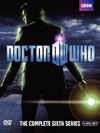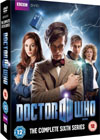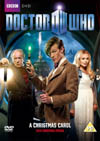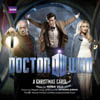DVD Extras include:
The other half of the story is Moffat's usual song and dance, most of which has also been tried and tested in previous episodes, and it continues to intrigue controversially and satisfy emotionally.
The Orbit of the Crystal FeastWell, thank goodness we get to go to an alien planet. Regular readers of my reviews will recall how strongly I advocate for that, particularly to reward our travels with discoveries of other cultures and ways of looking at life. In a Christmas Special, perhaps we could look at the holiday traditions of an alien culture.The trouble with today's unnamed planet, however, is that it isn't all that alien, and borrows all its imagery from very Earthly sources, cutting and pasting it into only a slightly different collage. Why Dickens' own industrial era is reproduced so faithfully on a futuristic colony in space is a scientific hilarity, but of course it's nostalgic, isn't it? Much of the most poetic dialogue betrays very Earthly and British thinking as well. Winter solstice is fundamentally an astronomical marker, based on things like a decent tilt of the Earth's rotational axis, the fact that this rotation is independent of our orbit around the sun, and the fact that our rotation is not "tidally locked" to the sun's surface like the planet Mercury (or Svartos), which has no day/night cycles. In fact, just go to the other end of our own planet, like Australia or New Zealand, where Christmas Solstice marks the brightest day of the year, and you get an idea of how non-universal some of these concepts are, and how much variation exists to be explored. The planet Uranus and its large moons get a winter solstice with an entire hemisphere in the dark all day and all night, and 42 Earth-years later comes the summer solstice where that same hemisphere gets sunshine (albeit faint) all day and all night. On a completely new planet, it's all up for grabs, limited only by imagination. How long is a year on Sardicktown's planet? If Christmas solstice came every 3 Earth-months or so, I wouldn't blame old Kazran for getting sick of it. I'd love more details on this planet's orbit and climate and winter solstice cycle, and more on "The Crystal Feast" that was originally celebrated here. One odd cast-off mention doesn't really satisfy. However, if Moffat wants to save the real fruits of his imagination for season 32 proper, and just do Christmas Specials as blatant pinches from other sources, I don't mind so much either. I'm not a particular fan of mandatory Christmas episodes every year. My favourite is still the "Sliders" season three episode "Season's Greedings".
Memory TimeTime travel is not this story's strength, with Moffat really going wild with the outdated "single rewriteable line". And no, he doesn't get to excuse it just by having Amy dance around citing "Time can be rewritten" like an airhead. Most of what the Doctor does in this story would help our scrooge's doubles in parallel/branching universes, not rewrite the one he meets originally in the "present" time, whenever that is. And after all the Doctor's excessive independent time jumps in this story, which flow off into parallel/branching universes, he'd be hard pressed to know which doubles of Amy and Rory he ended up saving and taking home at the end.By the way, how many of you out there chimed with Moffat's suggestion that Dickens' original "A Christmas Carol" was already (kind of) a time travel story? Technically, it isn't; it's more of a time observation thing. Scrooge looks at past, present, and possible future, and as a result of what he's seen, decides to change his destiny by making new choices in the present. The crux is entirely in "the now". Moffat's story may fail space/time/choice mechanics, but Charles Dickens aces it with flying colours. Just to be clear. Moffat's only decent wiggle room is in the idea of memory, but he doesn't confine himself to what would work in that regard. The adventure turns out about as ridiculous as "The Pandorica Opens" in that regard, but here it is at least self contained. Okay, whatever, Moffat gets no great points here.
A Character StoryWhat works is the human emotional element. And both Dickens' masterpiece and Moffat's usual arcs contribute to that and complement each other, even if it's a bit of a rerun of "The Girl in the Fireplace" and "The Eleventh Hour".Michael Gambon's portrayal of the elderly Kazran Sardick is the centerpiece holding the story together - completely enjoyable all the way through and receiving good support from the younger actors playing him at earlier ages and from Katherine Jenkins playing Abigail. Matt Smith is enjoyable as usual as the Doctor, and gets to make a highly unique entrance that I thoroughly liked on this occasion. One infers that the TARDIS is VERY busy in this story, but it does so mostly in the background - which is pretty much a necessity and an ideal this time around.
Amy and Rory have little to do in this one. I wouldn't have minded seeing more of them in a Christmas Special - however, if they're going to be occupied with anything approaching a proper honeymoon, you can leave that off-screen, as was so thankfully done here. And I am pleased that this was not the adventure that the closing dialogue of last season had led me to anticipate. This was better. There's some great financial imagery here regarding cryogenic chambers, but the health-related portions of it end up being ridiculous.
This story has become available on DVD and Blu-ray. Click on the Amazon symbol for the location nearest you for pricing and availability:
This story is also available in a single episode volume with unique bonus features. Click on the Amazon symbol for the location nearest you for pricing and availability:
Comments on this article are welcome. You may contact the author from this page:
|
|||||||||||||||||||||||||||||||||||||||||||













